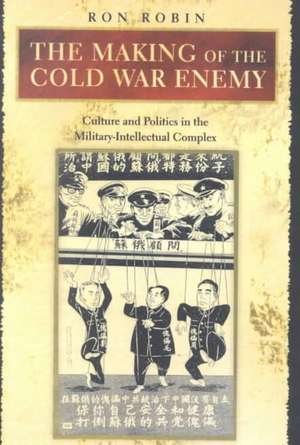The Making of the Cold War Enemy – Culture and Politics in the Military–Intellectual Complex
Autor Ron Theodore Robinen Limba Engleză Paperback – 13 mar 2003
Based at government-funded think tanks, the experts devised provocative solutions for key Cold War dilemmas, including psychological warfare projects, negotiation strategies during the Korean armistice, and morale studies in the Vietnam era. Robin examines factors that shaped the scientists' thinking and explores their psycho-cultural and rational choice explanations for enemy behavior. He reveals how the academics' intolerance for complexity ultimately reduced the nation's adversaries to borderline psychotics, ignored revolutionary social shifts in post-World War II Asia, and promoted the notion of a maniacal threat facing the United States. Putting the issue of scientific validity aside, Robin presents the first extensive analysis of the intellectual underpinnings of Cold War behavioral sciences in a book that will be indispensable reading for anyone interested in the era and its legacy.
Preț: 373.30 lei
Nou
Puncte Express: 560
Preț estimativ în valută:
71.43€ • 74.73$ • 59.34£
71.43€ • 74.73$ • 59.34£
Carte tipărită la comandă
Livrare economică 03-17 aprilie
Preluare comenzi: 021 569.72.76
Specificații
ISBN-13: 9780691114552
ISBN-10: 0691114552
Pagini: 296
Ilustrații: 12 halftones
Dimensiuni: 152 x 227 x 21 mm
Greutate: 0.42 kg
Editura: Princeton University Press
Locul publicării:Princeton, United States
ISBN-10: 0691114552
Pagini: 296
Ilustrații: 12 halftones
Dimensiuni: 152 x 227 x 21 mm
Greutate: 0.42 kg
Editura: Princeton University Press
Locul publicării:Princeton, United States
Notă biografică
Ron Robin is Professor of History and Dean of Students at Haifa University in Israel. He is the author of Enclaves of America: The Rhetoric of American Political Architecture Abroad and The Barbed Wire College: Reeducating German POWs in the United States during World War II (both Princeton).
Descriere
Tells the story of the rise of behavioral scientists in government and how their potentially dangerous, "American" assumptions about human behavior would shape US views of domestic disturbances and insurgencies in Third World countries.
